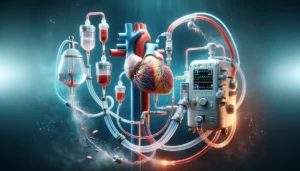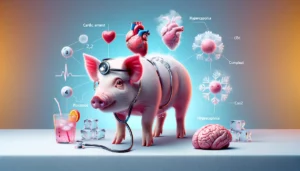
Mortality in Patients with Normal LV Function Requiring Emergency VA-ECMO for Postcardiotomy Cardiogenic Shock
This retrospective study examines outcomes in patients with normal preoperative left ventricular ejection fraction (LVEF) who required venoarterial extracorporeal membrane oxygenation (VA-ECMO) for postcardiotomy cardiogenic shock (PCCS) related to coronary malperfusion. Among 62,125 cardiac surgeries, 59 patients with normal LVEF needed VA-ECMO due to coronary malperfusion-related PCCS, showing a 30-day mortality rate of 50.8%. Complications were common, and factors like lactate levels >9.9 mmol/l before VA-ECMO, delay in revascularization, and peripheral arterial disease were significant mortality predictors. Early VA-ECMO initiation and revascularization are crucial for survival.



